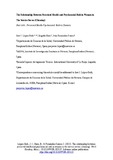Mostrar el registro sencillo del ítem
The relationship between perceived health and psychosocial risk in women in the service sector (cleaning)
| dc.creator | López-Goñi, José Javier | es_ES |
| dc.creator | Haro Escribano, Begoña | es_ES |
| dc.creator | Fernández Suárez, Iván | es_ES |
| dc.date.accessioned | 2022-12-30T07:37:31Z | |
| dc.date.available | 2022-12-30T07:37:31Z | |
| dc.date.issued | 2022 | |
| dc.identifier.citation | López-Goñi, J. J., Haro, B., & Fernández-Suárez, I. (2022). The relationship between perceived health and psychosocial risk in women in the service sector (Cleaning). Work, 1-9. https://doi.org/10.3233/WOR-205137 | en |
| dc.identifier.issn | 1051-9815 | |
| dc.identifier.uri | https://hdl.handle.net/2454/44533 | |
| dc.description.abstract | BACKGROUND: Cleaning is considered a female-dominant occupation. Women cleaning workers present a high risk of suffering impaired health probably as a result of performing low-skilled tasks. However, to date, no studies have been found that examine the health status of female cleaning workers in Spain. OBJECTIVE: The objectives were to 1) determine the level of perceived health in a sample of female cleaning workers, 2) evaluate the main psychosocial risks they face, 3) explore the relationship between perceived health and psychosocial risk factors, and 4) compare the perceived health of those women who present some psychosocial risk factor and those who do not. METHODS: This is a multi-centered cross-sectional study carried out in the service sector of a Spanish company. The final sample was composed of 455 female cleaning workers. Sociodemographic variables, perceived health status and psychosocial risk factors were assessed. RESULTS: Women presented a high perception of health status. The main psychosocial risk was lack of acknowledgement by their superiors, which affected 25.2% (n=111) of the sample. Moderate negative correlations (r=-.222 to -.442; p < .01) were identified between perceived health and evident psychosocial risks. Those women who presented some psychosocial risk (n = 174; 38.3%) had a worse state of perceived health in all variables studied. CONCLUSIONS: Presence of psychosocial risk had a relationship with a worse health perception. This article highlights the need to orient preventive actions in the psychosocial field. The COVID-19 pandemic represents a new situation to renew the health promotion between cleaning workers. | en |
| dc.format.mimetype | application/pdf | en |
| dc.language.iso | eng | en |
| dc.publisher | IOS Press | en |
| dc.relation.ispartof | Work, pre-press, pp. 1-9, 2022 | en |
| dc.subject | Perceived health | en |
| dc.subject | Women | en |
| dc.subject | Psychosocial risk factors | en |
| dc.subject | Health promotion | en |
| dc.subject | Cleaners | en |
| dc.title | The relationship between perceived health and psychosocial risk in women in the service sector (cleaning) | en |
| dc.type | Artículo / Artikulua | es |
| dc.type | info:eu-repo/semantics/article | en |
| dc.date.updated | 2022-12-29T13:30:00Z | |
| dc.contributor.department | Ciencias de la Salud | es_ES |
| dc.contributor.department | Osasun Zientziak | eu |
| dc.rights.accessRights | Acceso abierto / Sarbide irekia | es |
| dc.rights.accessRights | info:eu-repo/semantics/openAccess | en |
| dc.identifier.doi | 10.3233/WOR-205137 | |
| dc.relation.publisherversion | https://doi.org/10.3233/WOR-205137 | |
| dc.type.version | Versión aceptada / Onetsi den bertsioa | es |
| dc.type.version | info:eu-repo/semantics/acceptedVersion | en |


